Tourism's Impact on Growth and Emissions
VerifiedAdded on 2020/01/07
|14
|4200
|98
Literature Review
AI Summary
This assignment explores the relationship between tourism, economic growth, and carbon emissions within the European Union. It requires students to conduct a panel analysis using data from various sources to determine the impact of tourism on these factors. The analysis should consider both positive and negative aspects, acknowledging the complex interplay between these variables.
Contribute Materials
Your contribution can guide someone’s learning journey. Share your
documents today.
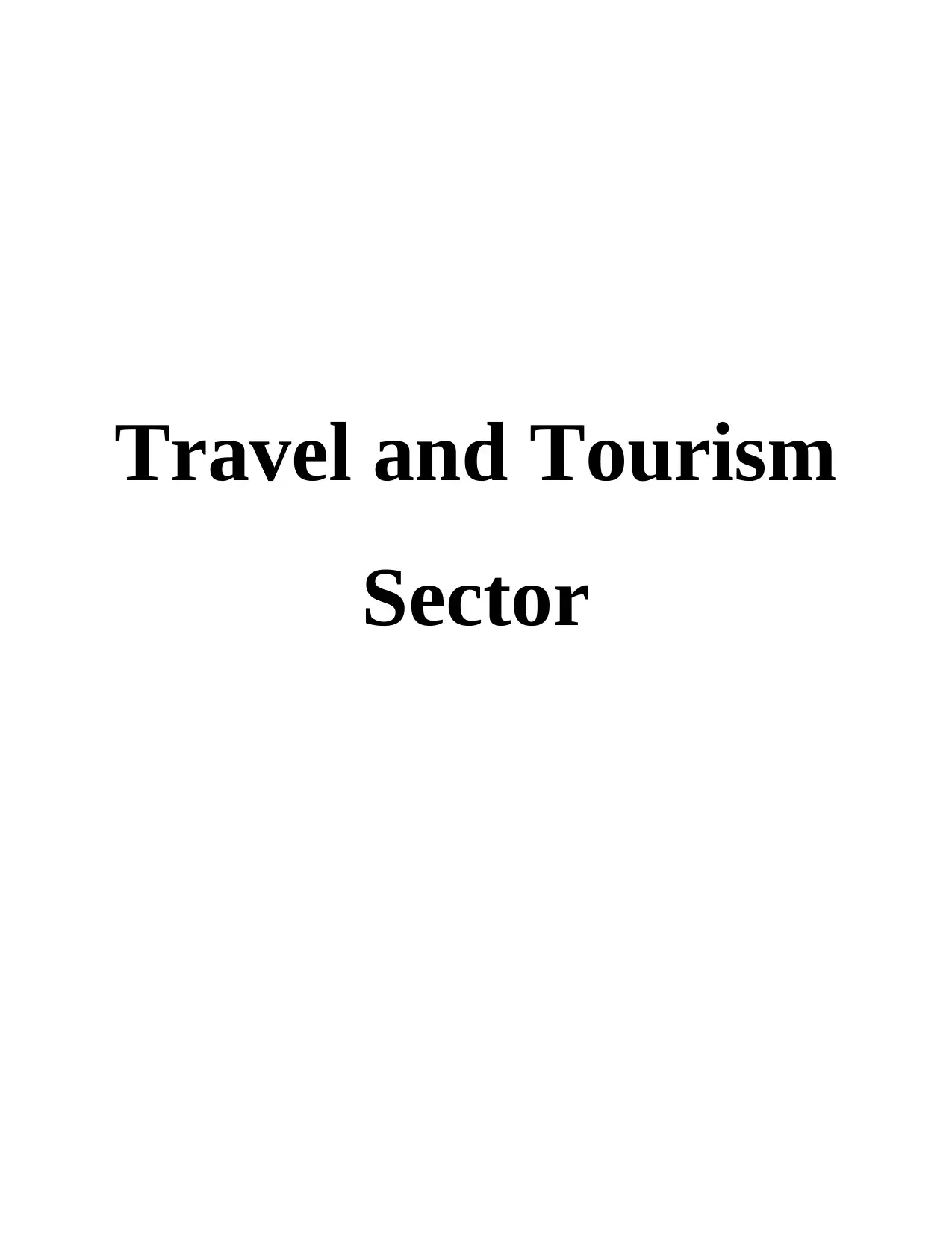
Travel and Tourism
Sector
Sector
Secure Best Marks with AI Grader
Need help grading? Try our AI Grader for instant feedback on your assignments.
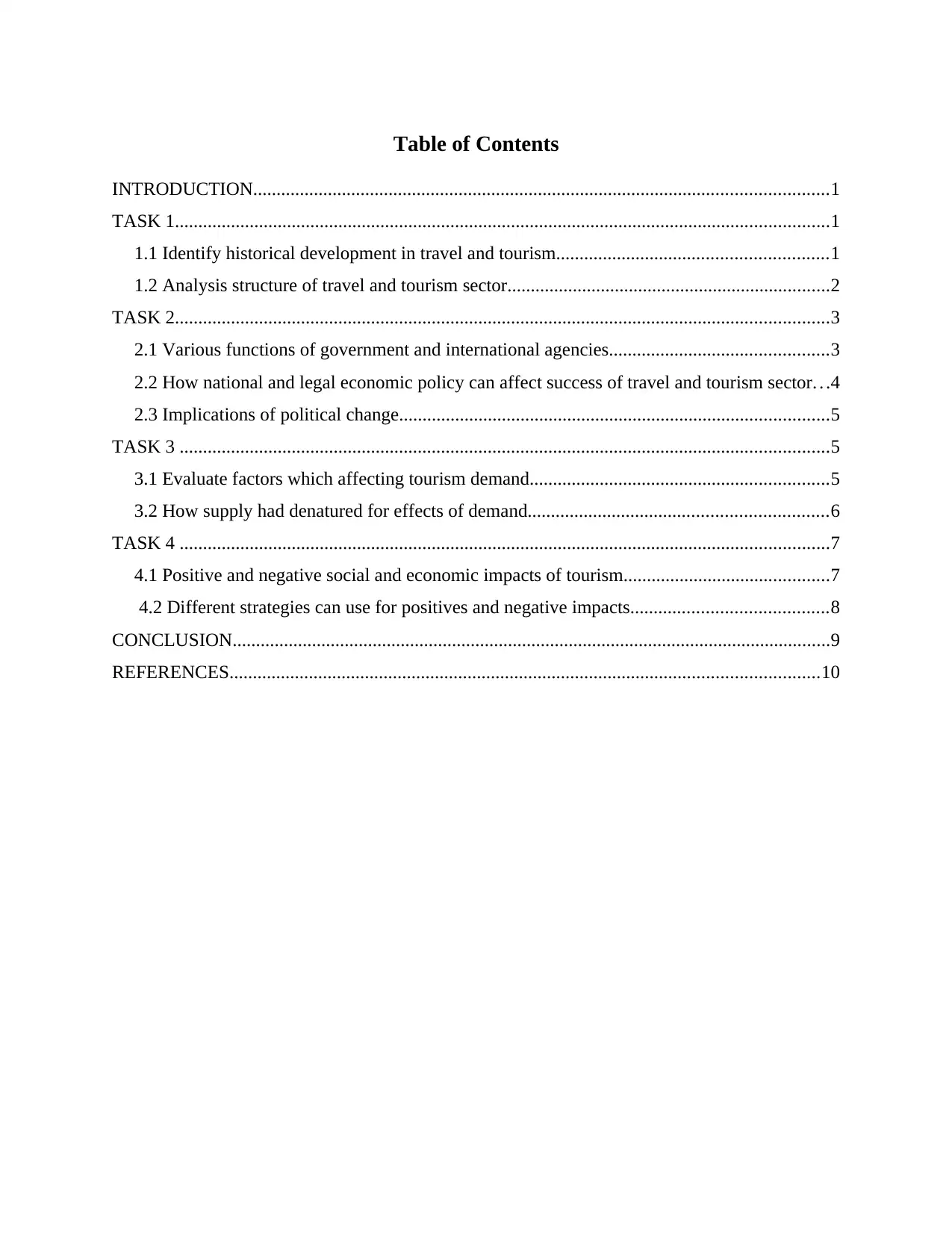
Table of Contents
INTRODUCTION...........................................................................................................................1
TASK 1............................................................................................................................................1
1.1 Identify historical development in travel and tourism..........................................................1
1.2 Analysis structure of travel and tourism sector.....................................................................2
TASK 2............................................................................................................................................3
2.1 Various functions of government and international agencies...............................................3
2.2 How national and legal economic policy can affect success of travel and tourism sector. . .4
2.3 Implications of political change............................................................................................5
TASK 3 ...........................................................................................................................................5
3.1 Evaluate factors which affecting tourism demand................................................................5
3.2 How supply had denatured for effects of demand................................................................6
TASK 4 ...........................................................................................................................................7
4.1 Positive and negative social and economic impacts of tourism............................................7
4.2 Different strategies can use for positives and negative impacts..........................................8
CONCLUSION................................................................................................................................9
REFERENCES..............................................................................................................................10
INTRODUCTION...........................................................................................................................1
TASK 1............................................................................................................................................1
1.1 Identify historical development in travel and tourism..........................................................1
1.2 Analysis structure of travel and tourism sector.....................................................................2
TASK 2............................................................................................................................................3
2.1 Various functions of government and international agencies...............................................3
2.2 How national and legal economic policy can affect success of travel and tourism sector. . .4
2.3 Implications of political change............................................................................................5
TASK 3 ...........................................................................................................................................5
3.1 Evaluate factors which affecting tourism demand................................................................5
3.2 How supply had denatured for effects of demand................................................................6
TASK 4 ...........................................................................................................................................7
4.1 Positive and negative social and economic impacts of tourism............................................7
4.2 Different strategies can use for positives and negative impacts..........................................8
CONCLUSION................................................................................................................................9
REFERENCES..............................................................................................................................10
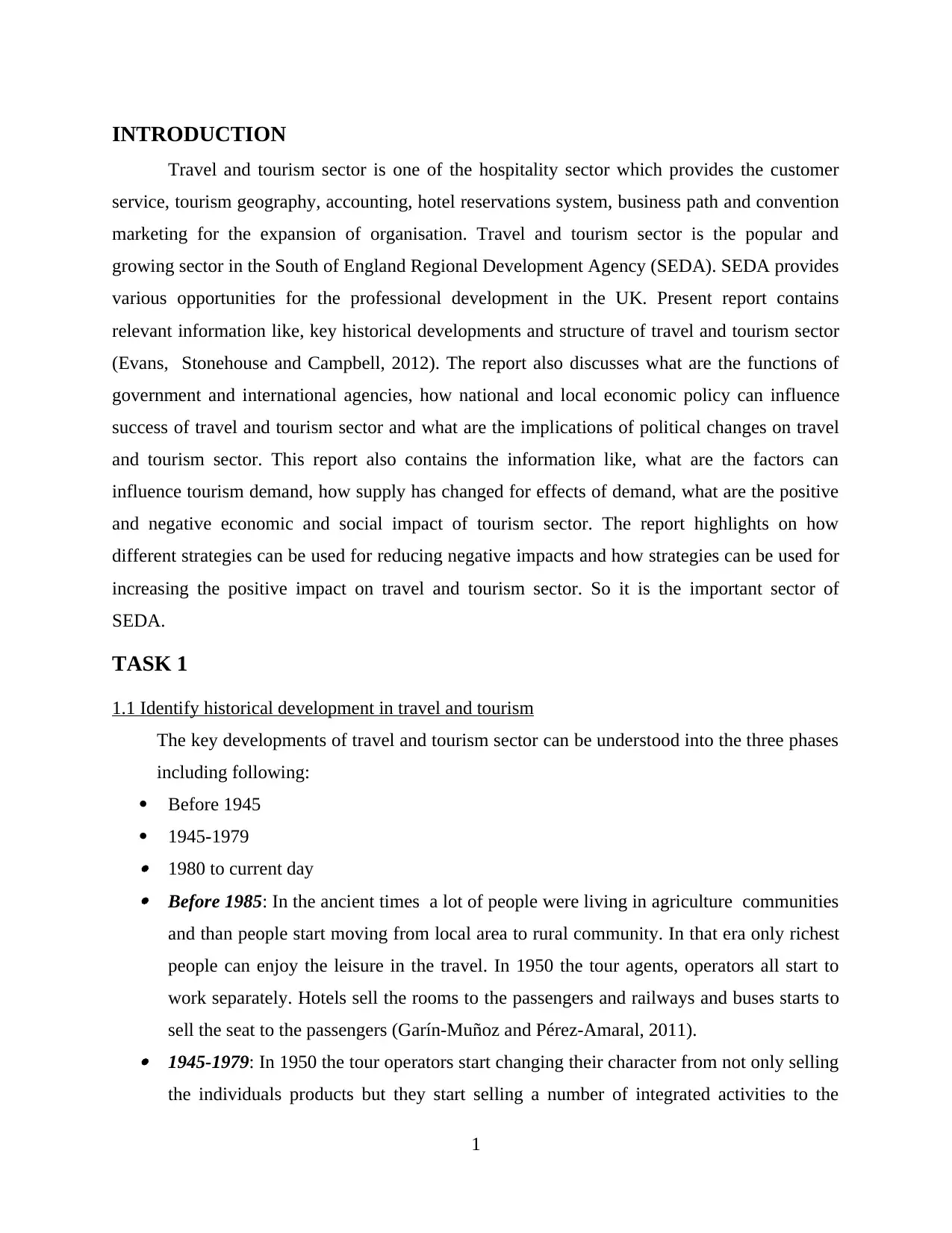
INTRODUCTION
Travel and tourism sector is one of the hospitality sector which provides the customer
service, tourism geography, accounting, hotel reservations system, business path and convention
marketing for the expansion of organisation. Travel and tourism sector is the popular and
growing sector in the South of England Regional Development Agency (SEDA). SEDA provides
various opportunities for the professional development in the UK. Present report contains
relevant information like, key historical developments and structure of travel and tourism sector
(Evans, Stonehouse and Campbell, 2012). The report also discusses what are the functions of
government and international agencies, how national and local economic policy can influence
success of travel and tourism sector and what are the implications of political changes on travel
and tourism sector. This report also contains the information like, what are the factors can
influence tourism demand, how supply has changed for effects of demand, what are the positive
and negative economic and social impact of tourism sector. The report highlights on how
different strategies can be used for reducing negative impacts and how strategies can be used for
increasing the positive impact on travel and tourism sector. So it is the important sector of
SEDA.
TASK 1
1.1 Identify historical development in travel and tourism
The key developments of travel and tourism sector can be understood into the three phases
including following:
Before 1945
1945-1979 1980 to current day Before 1985: In the ancient times a lot of people were living in agriculture communities
and than people start moving from local area to rural community. In that era only richest
people can enjoy the leisure in the travel. In 1950 the tour agents, operators all start to
work separately. Hotels sell the rooms to the passengers and railways and buses starts to
sell the seat to the passengers (Garín-Muñoz and Pérez-Amaral, 2011). 1945-1979: In 1950 the tour operators start changing their character from not only selling
the individuals products but they start selling a number of integrated activities to the
1
Travel and tourism sector is one of the hospitality sector which provides the customer
service, tourism geography, accounting, hotel reservations system, business path and convention
marketing for the expansion of organisation. Travel and tourism sector is the popular and
growing sector in the South of England Regional Development Agency (SEDA). SEDA provides
various opportunities for the professional development in the UK. Present report contains
relevant information like, key historical developments and structure of travel and tourism sector
(Evans, Stonehouse and Campbell, 2012). The report also discusses what are the functions of
government and international agencies, how national and local economic policy can influence
success of travel and tourism sector and what are the implications of political changes on travel
and tourism sector. This report also contains the information like, what are the factors can
influence tourism demand, how supply has changed for effects of demand, what are the positive
and negative economic and social impact of tourism sector. The report highlights on how
different strategies can be used for reducing negative impacts and how strategies can be used for
increasing the positive impact on travel and tourism sector. So it is the important sector of
SEDA.
TASK 1
1.1 Identify historical development in travel and tourism
The key developments of travel and tourism sector can be understood into the three phases
including following:
Before 1945
1945-1979 1980 to current day Before 1985: In the ancient times a lot of people were living in agriculture communities
and than people start moving from local area to rural community. In that era only richest
people can enjoy the leisure in the travel. In 1950 the tour agents, operators all start to
work separately. Hotels sell the rooms to the passengers and railways and buses starts to
sell the seat to the passengers (Garín-Muñoz and Pérez-Amaral, 2011). 1945-1979: In 1950 the tour operators start changing their character from not only selling
the individuals products but they start selling a number of integrated activities to the
1
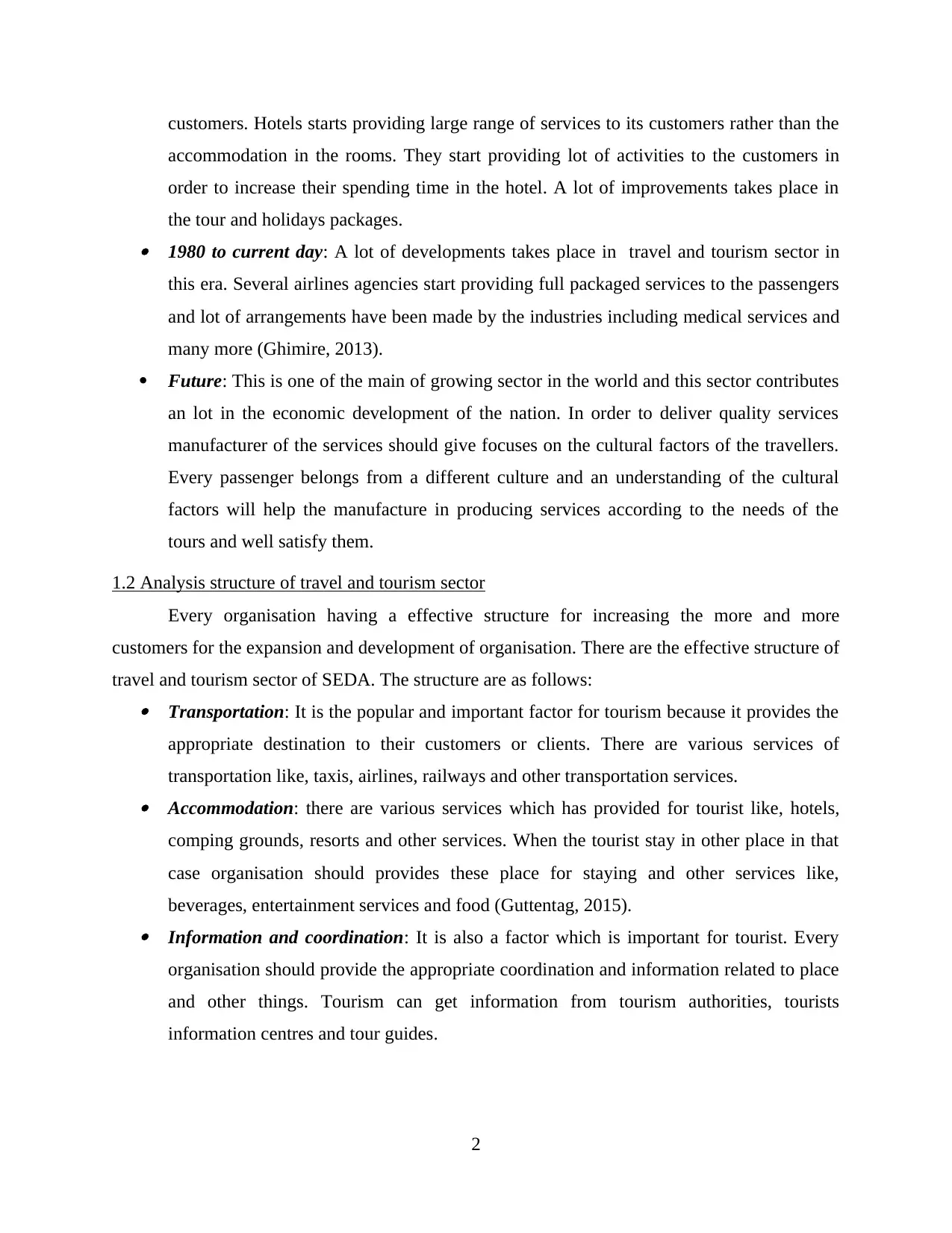
customers. Hotels starts providing large range of services to its customers rather than the
accommodation in the rooms. They start providing lot of activities to the customers in
order to increase their spending time in the hotel. A lot of improvements takes place in
the tour and holidays packages. 1980 to current day: A lot of developments takes place in travel and tourism sector in
this era. Several airlines agencies start providing full packaged services to the passengers
and lot of arrangements have been made by the industries including medical services and
many more (Ghimire, 2013).
Future: This is one of the main of growing sector in the world and this sector contributes
an lot in the economic development of the nation. In order to deliver quality services
manufacturer of the services should give focuses on the cultural factors of the travellers.
Every passenger belongs from a different culture and an understanding of the cultural
factors will help the manufacture in producing services according to the needs of the
tours and well satisfy them.
1.2 Analysis structure of travel and tourism sector
Every organisation having a effective structure for increasing the more and more
customers for the expansion and development of organisation. There are the effective structure of
travel and tourism sector of SEDA. The structure are as follows: Transportation: It is the popular and important factor for tourism because it provides the
appropriate destination to their customers or clients. There are various services of
transportation like, taxis, airlines, railways and other transportation services. Accommodation: there are various services which has provided for tourist like, hotels,
comping grounds, resorts and other services. When the tourist stay in other place in that
case organisation should provides these place for staying and other services like,
beverages, entertainment services and food (Guttentag, 2015). Information and coordination: It is also a factor which is important for tourist. Every
organisation should provide the appropriate coordination and information related to place
and other things. Tourism can get information from tourism authorities, tourists
information centres and tour guides.
2
accommodation in the rooms. They start providing lot of activities to the customers in
order to increase their spending time in the hotel. A lot of improvements takes place in
the tour and holidays packages. 1980 to current day: A lot of developments takes place in travel and tourism sector in
this era. Several airlines agencies start providing full packaged services to the passengers
and lot of arrangements have been made by the industries including medical services and
many more (Ghimire, 2013).
Future: This is one of the main of growing sector in the world and this sector contributes
an lot in the economic development of the nation. In order to deliver quality services
manufacturer of the services should give focuses on the cultural factors of the travellers.
Every passenger belongs from a different culture and an understanding of the cultural
factors will help the manufacture in producing services according to the needs of the
tours and well satisfy them.
1.2 Analysis structure of travel and tourism sector
Every organisation having a effective structure for increasing the more and more
customers for the expansion and development of organisation. There are the effective structure of
travel and tourism sector of SEDA. The structure are as follows: Transportation: It is the popular and important factor for tourism because it provides the
appropriate destination to their customers or clients. There are various services of
transportation like, taxis, airlines, railways and other transportation services. Accommodation: there are various services which has provided for tourist like, hotels,
comping grounds, resorts and other services. When the tourist stay in other place in that
case organisation should provides these place for staying and other services like,
beverages, entertainment services and food (Guttentag, 2015). Information and coordination: It is also a factor which is important for tourist. Every
organisation should provide the appropriate coordination and information related to place
and other things. Tourism can get information from tourism authorities, tourists
information centres and tour guides.
2
Secure Best Marks with AI Grader
Need help grading? Try our AI Grader for instant feedback on your assignments.
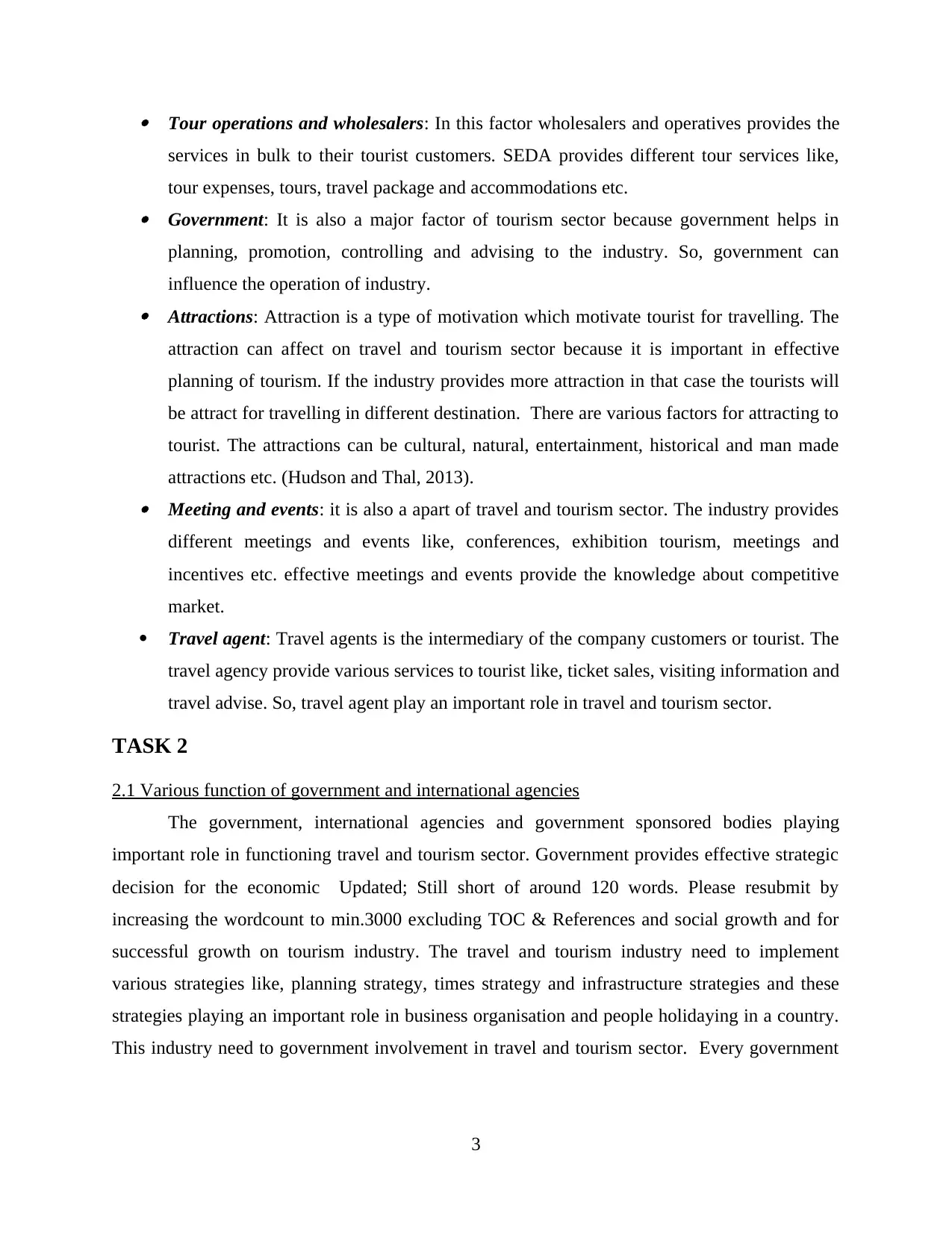
Tour operations and wholesalers: In this factor wholesalers and operatives provides the
services in bulk to their tourist customers. SEDA provides different tour services like,
tour expenses, tours, travel package and accommodations etc. Government: It is also a major factor of tourism sector because government helps in
planning, promotion, controlling and advising to the industry. So, government can
influence the operation of industry. Attractions: Attraction is a type of motivation which motivate tourist for travelling. The
attraction can affect on travel and tourism sector because it is important in effective
planning of tourism. If the industry provides more attraction in that case the tourists will
be attract for travelling in different destination. There are various factors for attracting to
tourist. The attractions can be cultural, natural, entertainment, historical and man made
attractions etc. (Hudson and Thal, 2013). Meeting and events: it is also a apart of travel and tourism sector. The industry provides
different meetings and events like, conferences, exhibition tourism, meetings and
incentives etc. effective meetings and events provide the knowledge about competitive
market.
Travel agent: Travel agents is the intermediary of the company customers or tourist. The
travel agency provide various services to tourist like, ticket sales, visiting information and
travel advise. So, travel agent play an important role in travel and tourism sector.
TASK 2
2.1 Various function of government and international agencies
The government, international agencies and government sponsored bodies playing
important role in functioning travel and tourism sector. Government provides effective strategic
decision for the economic Updated; Still short of around 120 words. Please resubmit by
increasing the wordcount to min.3000 excluding TOC & References and social growth and for
successful growth on tourism industry. The travel and tourism industry need to implement
various strategies like, planning strategy, times strategy and infrastructure strategies and these
strategies playing an important role in business organisation and people holidaying in a country.
This industry need to government involvement in travel and tourism sector. Every government
3
services in bulk to their tourist customers. SEDA provides different tour services like,
tour expenses, tours, travel package and accommodations etc. Government: It is also a major factor of tourism sector because government helps in
planning, promotion, controlling and advising to the industry. So, government can
influence the operation of industry. Attractions: Attraction is a type of motivation which motivate tourist for travelling. The
attraction can affect on travel and tourism sector because it is important in effective
planning of tourism. If the industry provides more attraction in that case the tourists will
be attract for travelling in different destination. There are various factors for attracting to
tourist. The attractions can be cultural, natural, entertainment, historical and man made
attractions etc. (Hudson and Thal, 2013). Meeting and events: it is also a apart of travel and tourism sector. The industry provides
different meetings and events like, conferences, exhibition tourism, meetings and
incentives etc. effective meetings and events provide the knowledge about competitive
market.
Travel agent: Travel agents is the intermediary of the company customers or tourist. The
travel agency provide various services to tourist like, ticket sales, visiting information and
travel advise. So, travel agent play an important role in travel and tourism sector.
TASK 2
2.1 Various function of government and international agencies
The government, international agencies and government sponsored bodies playing
important role in functioning travel and tourism sector. Government provides effective strategic
decision for the economic Updated; Still short of around 120 words. Please resubmit by
increasing the wordcount to min.3000 excluding TOC & References and social growth and for
successful growth on tourism industry. The travel and tourism industry need to implement
various strategies like, planning strategy, times strategy and infrastructure strategies and these
strategies playing an important role in business organisation and people holidaying in a country.
This industry need to government involvement in travel and tourism sector. Every government
3
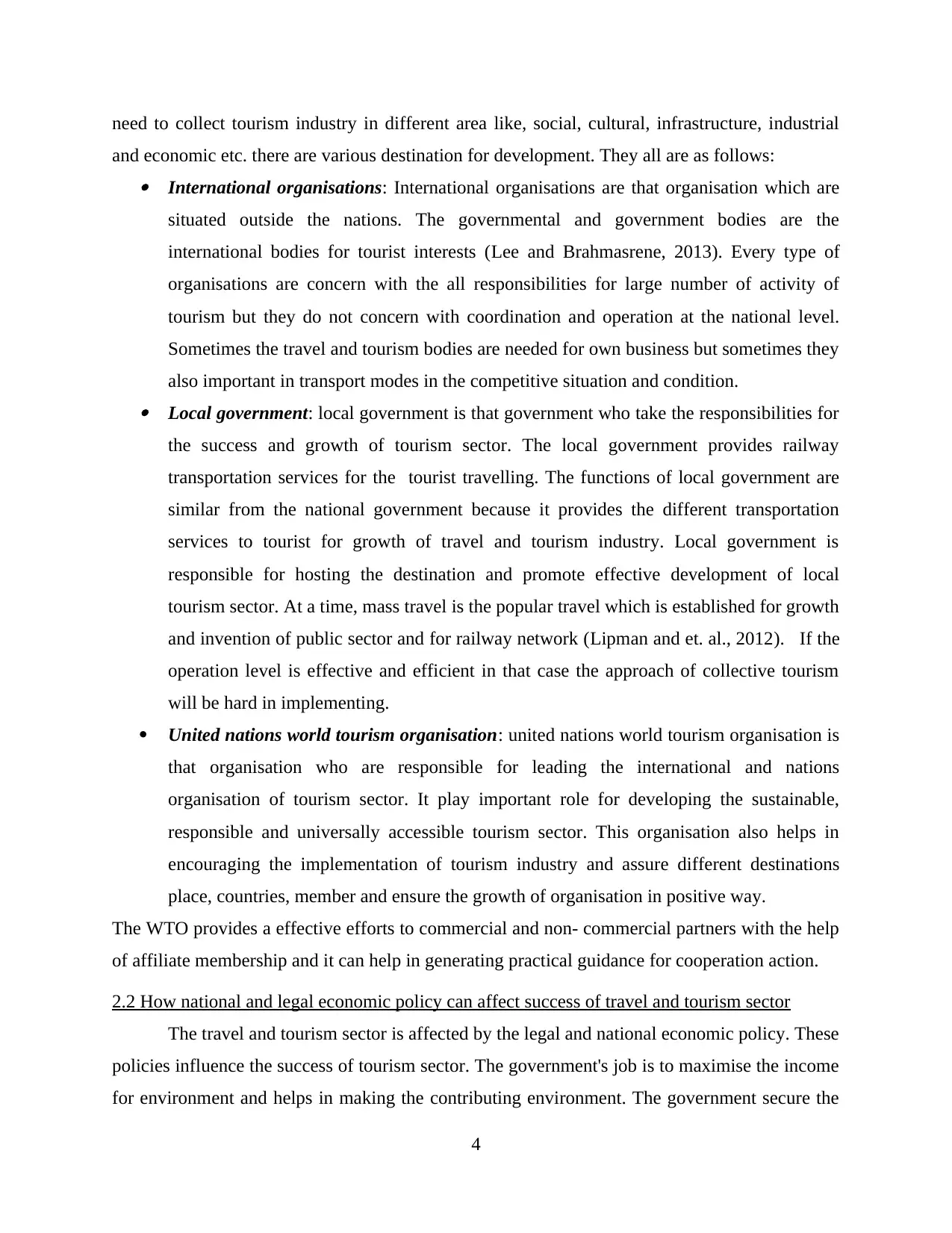
need to collect tourism industry in different area like, social, cultural, infrastructure, industrial
and economic etc. there are various destination for development. They all are as follows: International organisations: International organisations are that organisation which are
situated outside the nations. The governmental and government bodies are the
international bodies for tourist interests (Lee and Brahmasrene, 2013). Every type of
organisations are concern with the all responsibilities for large number of activity of
tourism but they do not concern with coordination and operation at the national level.
Sometimes the travel and tourism bodies are needed for own business but sometimes they
also important in transport modes in the competitive situation and condition. Local government: local government is that government who take the responsibilities for
the success and growth of tourism sector. The local government provides railway
transportation services for the tourist travelling. The functions of local government are
similar from the national government because it provides the different transportation
services to tourist for growth of travel and tourism industry. Local government is
responsible for hosting the destination and promote effective development of local
tourism sector. At a time, mass travel is the popular travel which is established for growth
and invention of public sector and for railway network (Lipman and et. al., 2012). If the
operation level is effective and efficient in that case the approach of collective tourism
will be hard in implementing.
United nations world tourism organisation: united nations world tourism organisation is
that organisation who are responsible for leading the international and nations
organisation of tourism sector. It play important role for developing the sustainable,
responsible and universally accessible tourism sector. This organisation also helps in
encouraging the implementation of tourism industry and assure different destinations
place, countries, member and ensure the growth of organisation in positive way.
The WTO provides a effective efforts to commercial and non- commercial partners with the help
of affiliate membership and it can help in generating practical guidance for cooperation action.
2.2 How national and legal economic policy can affect success of travel and tourism sector
The travel and tourism sector is affected by the legal and national economic policy. These
policies influence the success of tourism sector. The government's job is to maximise the income
for environment and helps in making the contributing environment. The government secure the
4
and economic etc. there are various destination for development. They all are as follows: International organisations: International organisations are that organisation which are
situated outside the nations. The governmental and government bodies are the
international bodies for tourist interests (Lee and Brahmasrene, 2013). Every type of
organisations are concern with the all responsibilities for large number of activity of
tourism but they do not concern with coordination and operation at the national level.
Sometimes the travel and tourism bodies are needed for own business but sometimes they
also important in transport modes in the competitive situation and condition. Local government: local government is that government who take the responsibilities for
the success and growth of tourism sector. The local government provides railway
transportation services for the tourist travelling. The functions of local government are
similar from the national government because it provides the different transportation
services to tourist for growth of travel and tourism industry. Local government is
responsible for hosting the destination and promote effective development of local
tourism sector. At a time, mass travel is the popular travel which is established for growth
and invention of public sector and for railway network (Lipman and et. al., 2012). If the
operation level is effective and efficient in that case the approach of collective tourism
will be hard in implementing.
United nations world tourism organisation: united nations world tourism organisation is
that organisation who are responsible for leading the international and nations
organisation of tourism sector. It play important role for developing the sustainable,
responsible and universally accessible tourism sector. This organisation also helps in
encouraging the implementation of tourism industry and assure different destinations
place, countries, member and ensure the growth of organisation in positive way.
The WTO provides a effective efforts to commercial and non- commercial partners with the help
of affiliate membership and it can help in generating practical guidance for cooperation action.
2.2 How national and legal economic policy can affect success of travel and tourism sector
The travel and tourism sector is affected by the legal and national economic policy. These
policies influence the success of tourism sector. The government's job is to maximise the income
for environment and helps in making the contributing environment. The government secure the
4
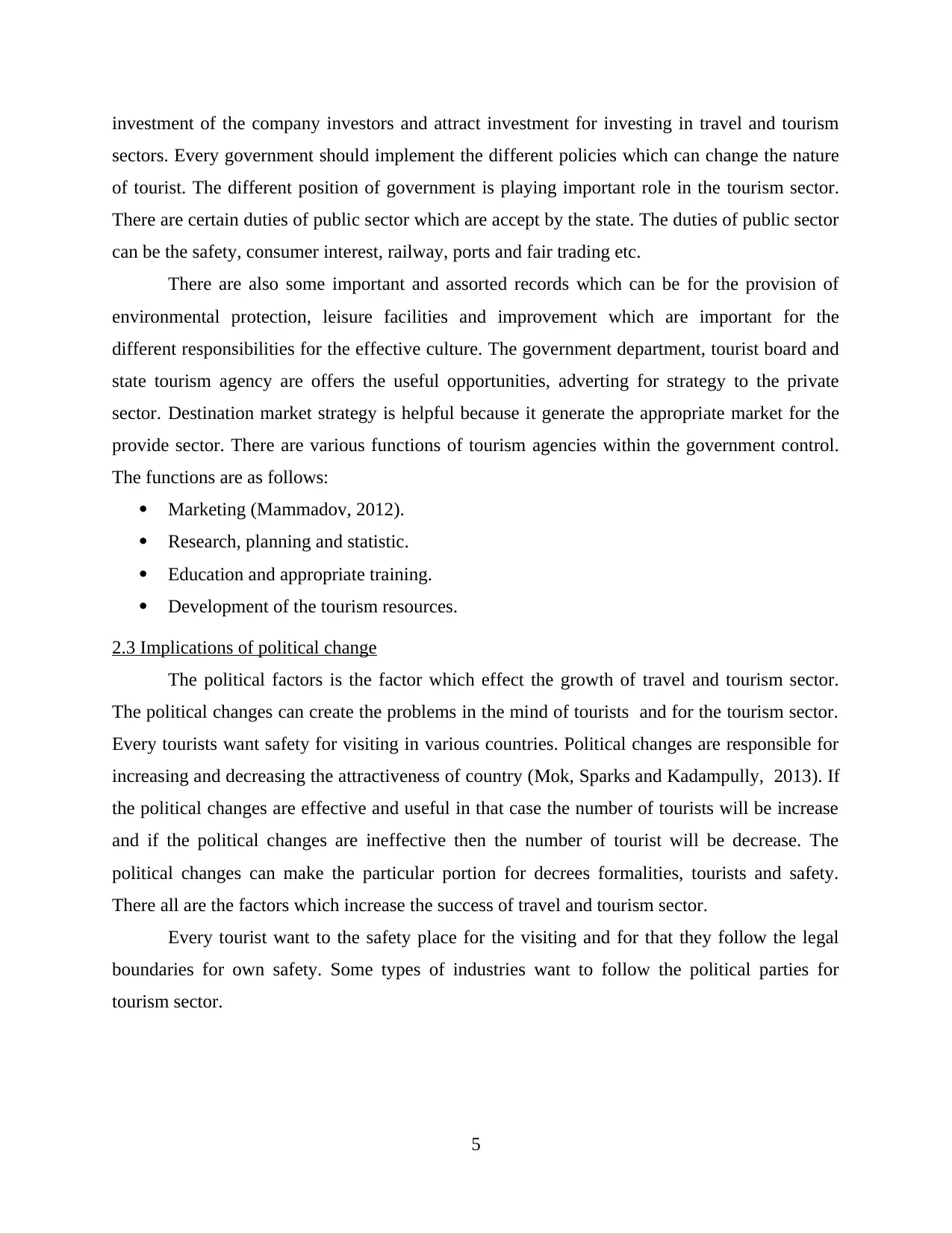
investment of the company investors and attract investment for investing in travel and tourism
sectors. Every government should implement the different policies which can change the nature
of tourist. The different position of government is playing important role in the tourism sector.
There are certain duties of public sector which are accept by the state. The duties of public sector
can be the safety, consumer interest, railway, ports and fair trading etc.
There are also some important and assorted records which can be for the provision of
environmental protection, leisure facilities and improvement which are important for the
different responsibilities for the effective culture. The government department, tourist board and
state tourism agency are offers the useful opportunities, adverting for strategy to the private
sector. Destination market strategy is helpful because it generate the appropriate market for the
provide sector. There are various functions of tourism agencies within the government control.
The functions are as follows:
Marketing (Mammadov, 2012).
Research, planning and statistic.
Education and appropriate training.
Development of the tourism resources.
2.3 Implications of political change
The political factors is the factor which effect the growth of travel and tourism sector.
The political changes can create the problems in the mind of tourists and for the tourism sector.
Every tourists want safety for visiting in various countries. Political changes are responsible for
increasing and decreasing the attractiveness of country (Mok, Sparks and Kadampully, 2013). If
the political changes are effective and useful in that case the number of tourists will be increase
and if the political changes are ineffective then the number of tourist will be decrease. The
political changes can make the particular portion for decrees formalities, tourists and safety.
There all are the factors which increase the success of travel and tourism sector.
Every tourist want to the safety place for the visiting and for that they follow the legal
boundaries for own safety. Some types of industries want to follow the political parties for
tourism sector.
5
sectors. Every government should implement the different policies which can change the nature
of tourist. The different position of government is playing important role in the tourism sector.
There are certain duties of public sector which are accept by the state. The duties of public sector
can be the safety, consumer interest, railway, ports and fair trading etc.
There are also some important and assorted records which can be for the provision of
environmental protection, leisure facilities and improvement which are important for the
different responsibilities for the effective culture. The government department, tourist board and
state tourism agency are offers the useful opportunities, adverting for strategy to the private
sector. Destination market strategy is helpful because it generate the appropriate market for the
provide sector. There are various functions of tourism agencies within the government control.
The functions are as follows:
Marketing (Mammadov, 2012).
Research, planning and statistic.
Education and appropriate training.
Development of the tourism resources.
2.3 Implications of political change
The political factors is the factor which effect the growth of travel and tourism sector.
The political changes can create the problems in the mind of tourists and for the tourism sector.
Every tourists want safety for visiting in various countries. Political changes are responsible for
increasing and decreasing the attractiveness of country (Mok, Sparks and Kadampully, 2013). If
the political changes are effective and useful in that case the number of tourists will be increase
and if the political changes are ineffective then the number of tourist will be decrease. The
political changes can make the particular portion for decrees formalities, tourists and safety.
There all are the factors which increase the success of travel and tourism sector.
Every tourist want to the safety place for the visiting and for that they follow the legal
boundaries for own safety. Some types of industries want to follow the political parties for
tourism sector.
5
Paraphrase This Document
Need a fresh take? Get an instant paraphrase of this document with our AI Paraphraser
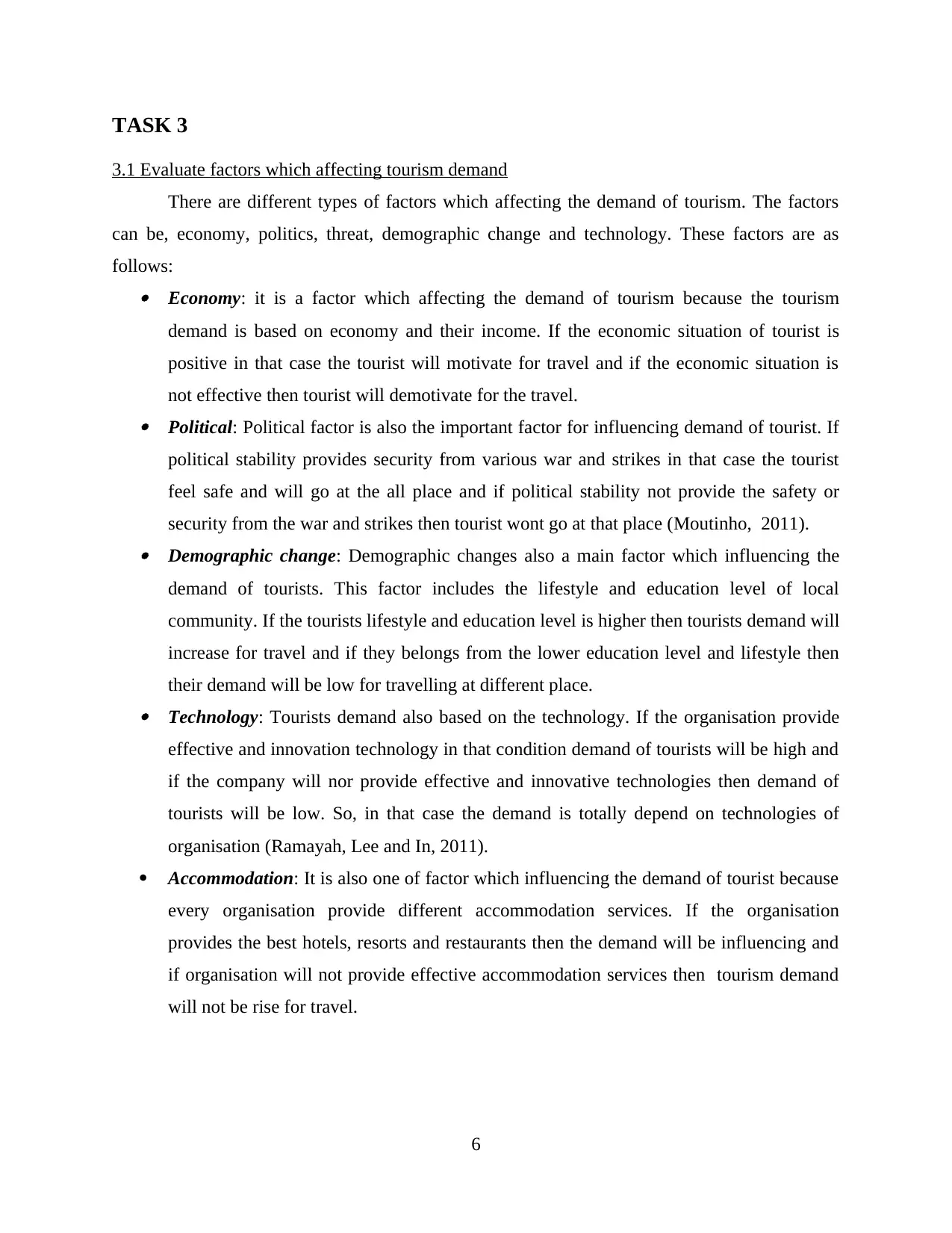
TASK 3
3.1 Evaluate factors which affecting tourism demand
There are different types of factors which affecting the demand of tourism. The factors
can be, economy, politics, threat, demographic change and technology. These factors are as
follows: Economy: it is a factor which affecting the demand of tourism because the tourism
demand is based on economy and their income. If the economic situation of tourist is
positive in that case the tourist will motivate for travel and if the economic situation is
not effective then tourist will demotivate for the travel. Political: Political factor is also the important factor for influencing demand of tourist. If
political stability provides security from various war and strikes in that case the tourist
feel safe and will go at the all place and if political stability not provide the safety or
security from the war and strikes then tourist wont go at that place (Moutinho, 2011). Demographic change: Demographic changes also a main factor which influencing the
demand of tourists. This factor includes the lifestyle and education level of local
community. If the tourists lifestyle and education level is higher then tourists demand will
increase for travel and if they belongs from the lower education level and lifestyle then
their demand will be low for travelling at different place. Technology: Tourists demand also based on the technology. If the organisation provide
effective and innovation technology in that condition demand of tourists will be high and
if the company will nor provide effective and innovative technologies then demand of
tourists will be low. So, in that case the demand is totally depend on technologies of
organisation (Ramayah, Lee and In, 2011).
Accommodation: It is also one of factor which influencing the demand of tourist because
every organisation provide different accommodation services. If the organisation
provides the best hotels, resorts and restaurants then the demand will be influencing and
if organisation will not provide effective accommodation services then tourism demand
will not be rise for travel.
6
3.1 Evaluate factors which affecting tourism demand
There are different types of factors which affecting the demand of tourism. The factors
can be, economy, politics, threat, demographic change and technology. These factors are as
follows: Economy: it is a factor which affecting the demand of tourism because the tourism
demand is based on economy and their income. If the economic situation of tourist is
positive in that case the tourist will motivate for travel and if the economic situation is
not effective then tourist will demotivate for the travel. Political: Political factor is also the important factor for influencing demand of tourist. If
political stability provides security from various war and strikes in that case the tourist
feel safe and will go at the all place and if political stability not provide the safety or
security from the war and strikes then tourist wont go at that place (Moutinho, 2011). Demographic change: Demographic changes also a main factor which influencing the
demand of tourists. This factor includes the lifestyle and education level of local
community. If the tourists lifestyle and education level is higher then tourists demand will
increase for travel and if they belongs from the lower education level and lifestyle then
their demand will be low for travelling at different place. Technology: Tourists demand also based on the technology. If the organisation provide
effective and innovation technology in that condition demand of tourists will be high and
if the company will nor provide effective and innovative technologies then demand of
tourists will be low. So, in that case the demand is totally depend on technologies of
organisation (Ramayah, Lee and In, 2011).
Accommodation: It is also one of factor which influencing the demand of tourist because
every organisation provide different accommodation services. If the organisation
provides the best hotels, resorts and restaurants then the demand will be influencing and
if organisation will not provide effective accommodation services then tourism demand
will not be rise for travel.
6
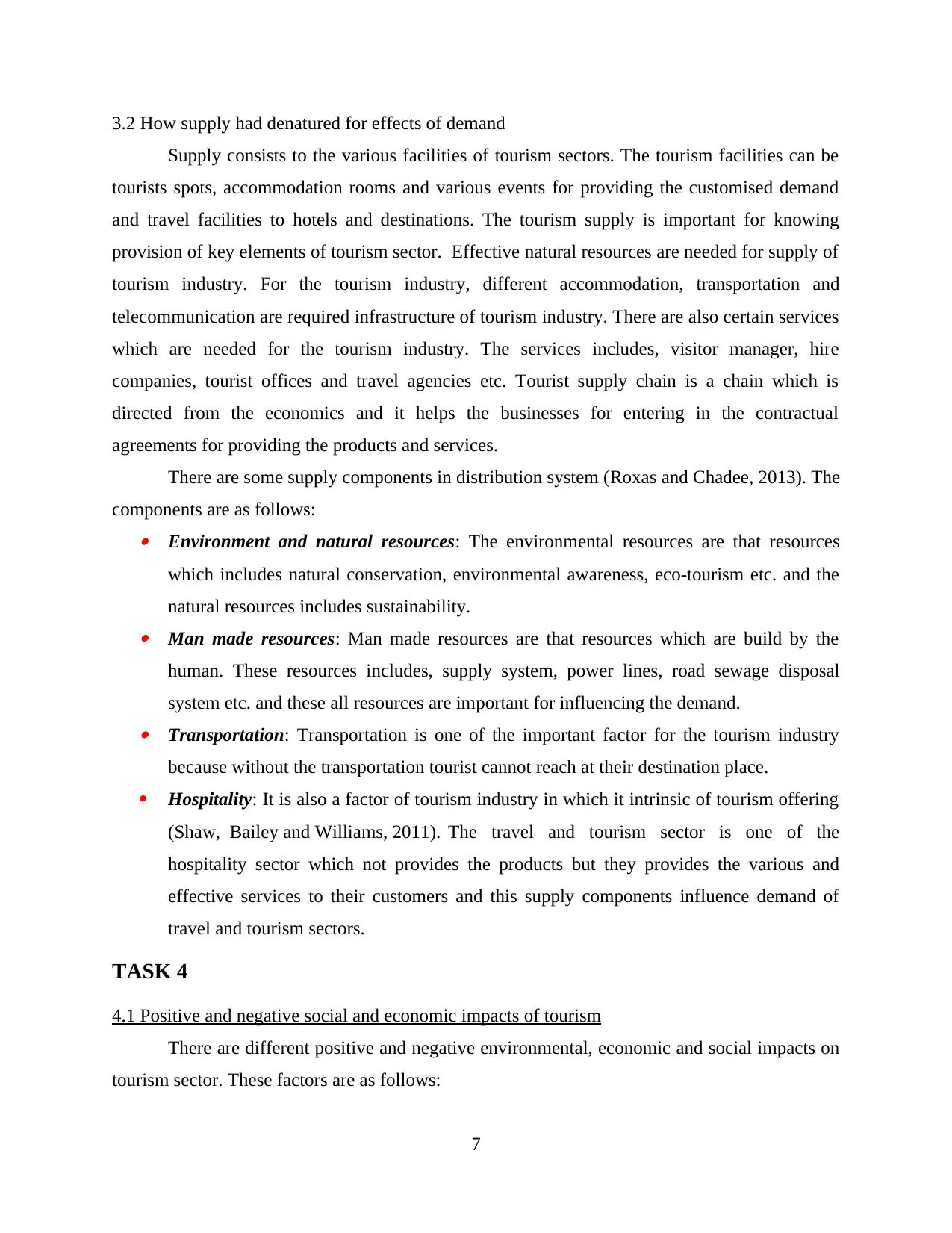
3.2 How supply had denatured for effects of demand
Supply consists to the various facilities of tourism sectors. The tourism facilities can be
tourists spots, accommodation rooms and various events for providing the customised demand
and travel facilities to hotels and destinations. The tourism supply is important for knowing
provision of key elements of tourism sector. Effective natural resources are needed for supply of
tourism industry. For the tourism industry, different accommodation, transportation and
telecommunication are required infrastructure of tourism industry. There are also certain services
which are needed for the tourism industry. The services includes, visitor manager, hire
companies, tourist offices and travel agencies etc. Tourist supply chain is a chain which is
directed from the economics and it helps the businesses for entering in the contractual
agreements for providing the products and services.
There are some supply components in distribution system (Roxas and Chadee, 2013). The
components are as follows: Environment and natural resources: The environmental resources are that resources
which includes natural conservation, environmental awareness, eco-tourism etc. and the
natural resources includes sustainability. Man made resources: Man made resources are that resources which are build by the
human. These resources includes, supply system, power lines, road sewage disposal
system etc. and these all resources are important for influencing the demand. Transportation: Transportation is one of the important factor for the tourism industry
because without the transportation tourist cannot reach at their destination place.
Hospitality: It is also a factor of tourism industry in which it intrinsic of tourism offering
(Shaw, Bailey and Williams, 2011). The travel and tourism sector is one of the
hospitality sector which not provides the products but they provides the various and
effective services to their customers and this supply components influence demand of
travel and tourism sectors.
TASK 4
4.1 Positive and negative social and economic impacts of tourism
There are different positive and negative environmental, economic and social impacts on
tourism sector. These factors are as follows:
7
Supply consists to the various facilities of tourism sectors. The tourism facilities can be
tourists spots, accommodation rooms and various events for providing the customised demand
and travel facilities to hotels and destinations. The tourism supply is important for knowing
provision of key elements of tourism sector. Effective natural resources are needed for supply of
tourism industry. For the tourism industry, different accommodation, transportation and
telecommunication are required infrastructure of tourism industry. There are also certain services
which are needed for the tourism industry. The services includes, visitor manager, hire
companies, tourist offices and travel agencies etc. Tourist supply chain is a chain which is
directed from the economics and it helps the businesses for entering in the contractual
agreements for providing the products and services.
There are some supply components in distribution system (Roxas and Chadee, 2013). The
components are as follows: Environment and natural resources: The environmental resources are that resources
which includes natural conservation, environmental awareness, eco-tourism etc. and the
natural resources includes sustainability. Man made resources: Man made resources are that resources which are build by the
human. These resources includes, supply system, power lines, road sewage disposal
system etc. and these all resources are important for influencing the demand. Transportation: Transportation is one of the important factor for the tourism industry
because without the transportation tourist cannot reach at their destination place.
Hospitality: It is also a factor of tourism industry in which it intrinsic of tourism offering
(Shaw, Bailey and Williams, 2011). The travel and tourism sector is one of the
hospitality sector which not provides the products but they provides the various and
effective services to their customers and this supply components influence demand of
travel and tourism sectors.
TASK 4
4.1 Positive and negative social and economic impacts of tourism
There are different positive and negative environmental, economic and social impacts on
tourism sector. These factors are as follows:
7
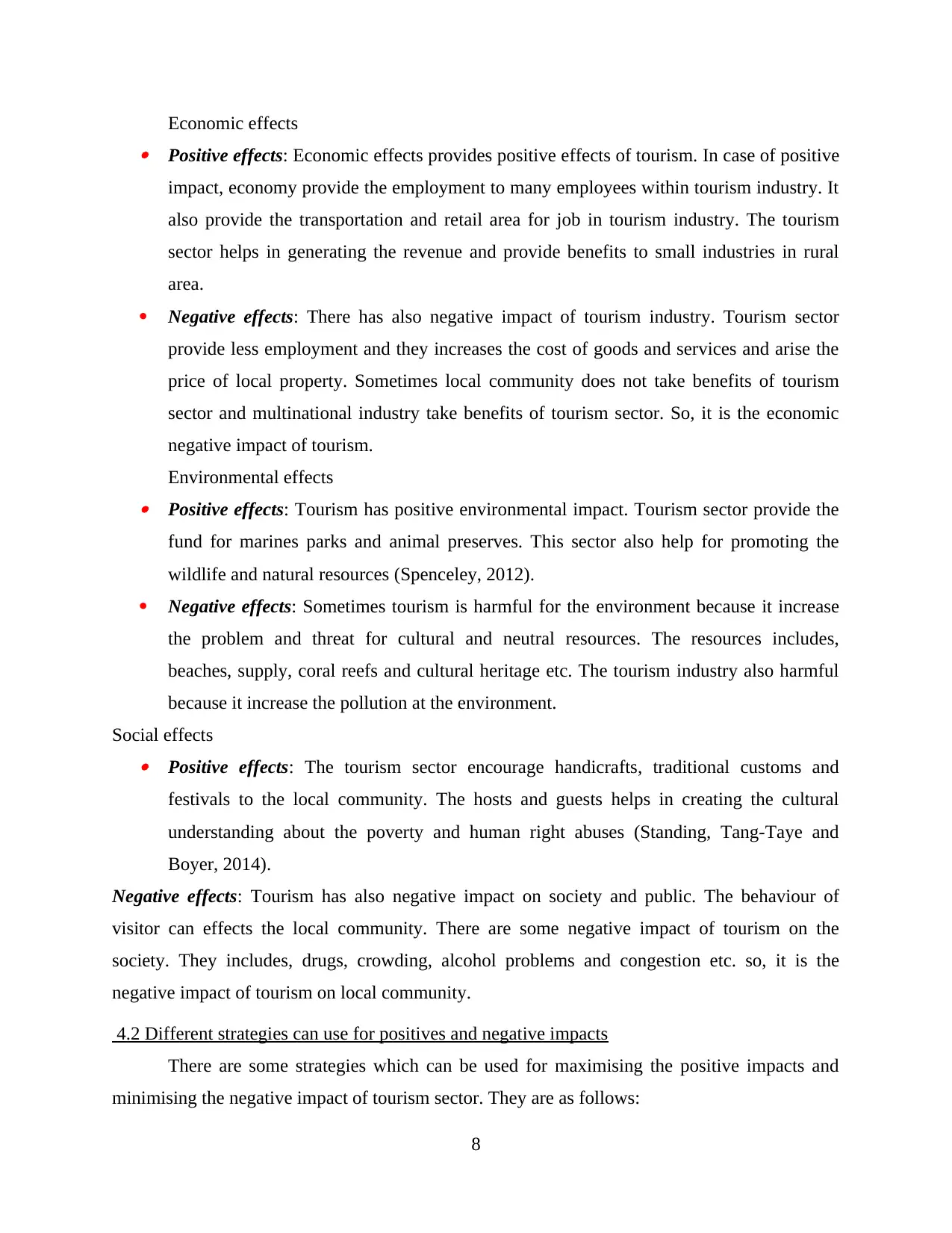
Economic effects Positive effects: Economic effects provides positive effects of tourism. In case of positive
impact, economy provide the employment to many employees within tourism industry. It
also provide the transportation and retail area for job in tourism industry. The tourism
sector helps in generating the revenue and provide benefits to small industries in rural
area.
Negative effects: There has also negative impact of tourism industry. Tourism sector
provide less employment and they increases the cost of goods and services and arise the
price of local property. Sometimes local community does not take benefits of tourism
sector and multinational industry take benefits of tourism sector. So, it is the economic
negative impact of tourism.
Environmental effects Positive effects: Tourism has positive environmental impact. Tourism sector provide the
fund for marines parks and animal preserves. This sector also help for promoting the
wildlife and natural resources (Spenceley, 2012).
Negative effects: Sometimes tourism is harmful for the environment because it increase
the problem and threat for cultural and neutral resources. The resources includes,
beaches, supply, coral reefs and cultural heritage etc. The tourism industry also harmful
because it increase the pollution at the environment.
Social effects Positive effects: The tourism sector encourage handicrafts, traditional customs and
festivals to the local community. The hosts and guests helps in creating the cultural
understanding about the poverty and human right abuses (Standing, Tang-Taye and
Boyer, 2014).
Negative effects: Tourism has also negative impact on society and public. The behaviour of
visitor can effects the local community. There are some negative impact of tourism on the
society. They includes, drugs, crowding, alcohol problems and congestion etc. so, it is the
negative impact of tourism on local community.
4.2 Different strategies can use for positives and negative impacts
There are some strategies which can be used for maximising the positive impacts and
minimising the negative impact of tourism sector. They are as follows:
8
impact, economy provide the employment to many employees within tourism industry. It
also provide the transportation and retail area for job in tourism industry. The tourism
sector helps in generating the revenue and provide benefits to small industries in rural
area.
Negative effects: There has also negative impact of tourism industry. Tourism sector
provide less employment and they increases the cost of goods and services and arise the
price of local property. Sometimes local community does not take benefits of tourism
sector and multinational industry take benefits of tourism sector. So, it is the economic
negative impact of tourism.
Environmental effects Positive effects: Tourism has positive environmental impact. Tourism sector provide the
fund for marines parks and animal preserves. This sector also help for promoting the
wildlife and natural resources (Spenceley, 2012).
Negative effects: Sometimes tourism is harmful for the environment because it increase
the problem and threat for cultural and neutral resources. The resources includes,
beaches, supply, coral reefs and cultural heritage etc. The tourism industry also harmful
because it increase the pollution at the environment.
Social effects Positive effects: The tourism sector encourage handicrafts, traditional customs and
festivals to the local community. The hosts and guests helps in creating the cultural
understanding about the poverty and human right abuses (Standing, Tang-Taye and
Boyer, 2014).
Negative effects: Tourism has also negative impact on society and public. The behaviour of
visitor can effects the local community. There are some negative impact of tourism on the
society. They includes, drugs, crowding, alcohol problems and congestion etc. so, it is the
negative impact of tourism on local community.
4.2 Different strategies can use for positives and negative impacts
There are some strategies which can be used for maximising the positive impacts and
minimising the negative impact of tourism sector. They are as follows:
8
Secure Best Marks with AI Grader
Need help grading? Try our AI Grader for instant feedback on your assignments.
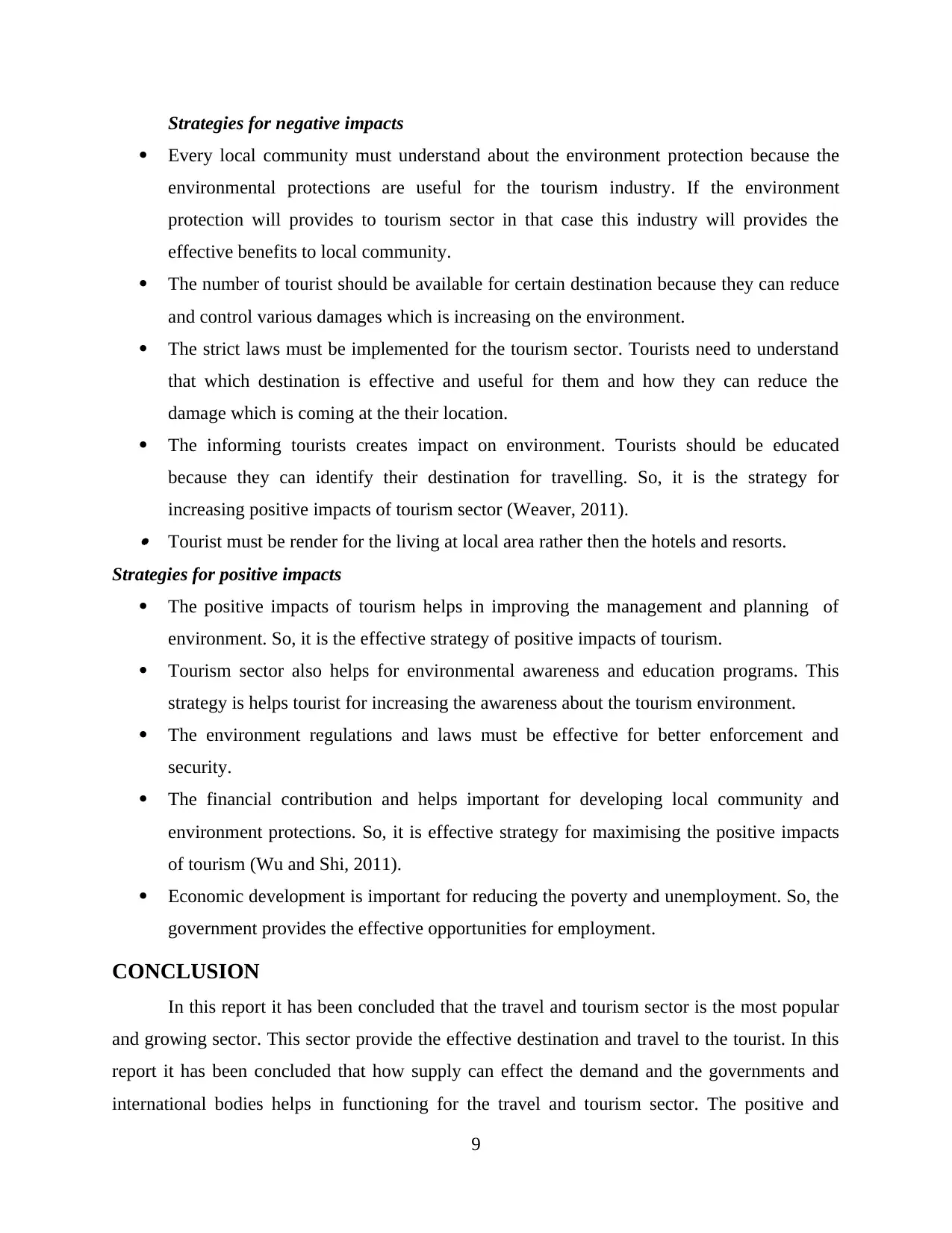
Strategies for negative impacts
Every local community must understand about the environment protection because the
environmental protections are useful for the tourism industry. If the environment
protection will provides to tourism sector in that case this industry will provides the
effective benefits to local community.
The number of tourist should be available for certain destination because they can reduce
and control various damages which is increasing on the environment.
The strict laws must be implemented for the tourism sector. Tourists need to understand
that which destination is effective and useful for them and how they can reduce the
damage which is coming at the their location.
The informing tourists creates impact on environment. Tourists should be educated
because they can identify their destination for travelling. So, it is the strategy for
increasing positive impacts of tourism sector (Weaver, 2011). Tourist must be render for the living at local area rather then the hotels and resorts.
Strategies for positive impacts
The positive impacts of tourism helps in improving the management and planning of
environment. So, it is the effective strategy of positive impacts of tourism.
Tourism sector also helps for environmental awareness and education programs. This
strategy is helps tourist for increasing the awareness about the tourism environment.
The environment regulations and laws must be effective for better enforcement and
security.
The financial contribution and helps important for developing local community and
environment protections. So, it is effective strategy for maximising the positive impacts
of tourism (Wu and Shi, 2011).
Economic development is important for reducing the poverty and unemployment. So, the
government provides the effective opportunities for employment.
CONCLUSION
In this report it has been concluded that the travel and tourism sector is the most popular
and growing sector. This sector provide the effective destination and travel to the tourist. In this
report it has been concluded that how supply can effect the demand and the governments and
international bodies helps in functioning for the travel and tourism sector. The positive and
9
Every local community must understand about the environment protection because the
environmental protections are useful for the tourism industry. If the environment
protection will provides to tourism sector in that case this industry will provides the
effective benefits to local community.
The number of tourist should be available for certain destination because they can reduce
and control various damages which is increasing on the environment.
The strict laws must be implemented for the tourism sector. Tourists need to understand
that which destination is effective and useful for them and how they can reduce the
damage which is coming at the their location.
The informing tourists creates impact on environment. Tourists should be educated
because they can identify their destination for travelling. So, it is the strategy for
increasing positive impacts of tourism sector (Weaver, 2011). Tourist must be render for the living at local area rather then the hotels and resorts.
Strategies for positive impacts
The positive impacts of tourism helps in improving the management and planning of
environment. So, it is the effective strategy of positive impacts of tourism.
Tourism sector also helps for environmental awareness and education programs. This
strategy is helps tourist for increasing the awareness about the tourism environment.
The environment regulations and laws must be effective for better enforcement and
security.
The financial contribution and helps important for developing local community and
environment protections. So, it is effective strategy for maximising the positive impacts
of tourism (Wu and Shi, 2011).
Economic development is important for reducing the poverty and unemployment. So, the
government provides the effective opportunities for employment.
CONCLUSION
In this report it has been concluded that the travel and tourism sector is the most popular
and growing sector. This sector provide the effective destination and travel to the tourist. In this
report it has been concluded that how supply can effect the demand and the governments and
international bodies helps in functioning for the travel and tourism sector. The positive and
9
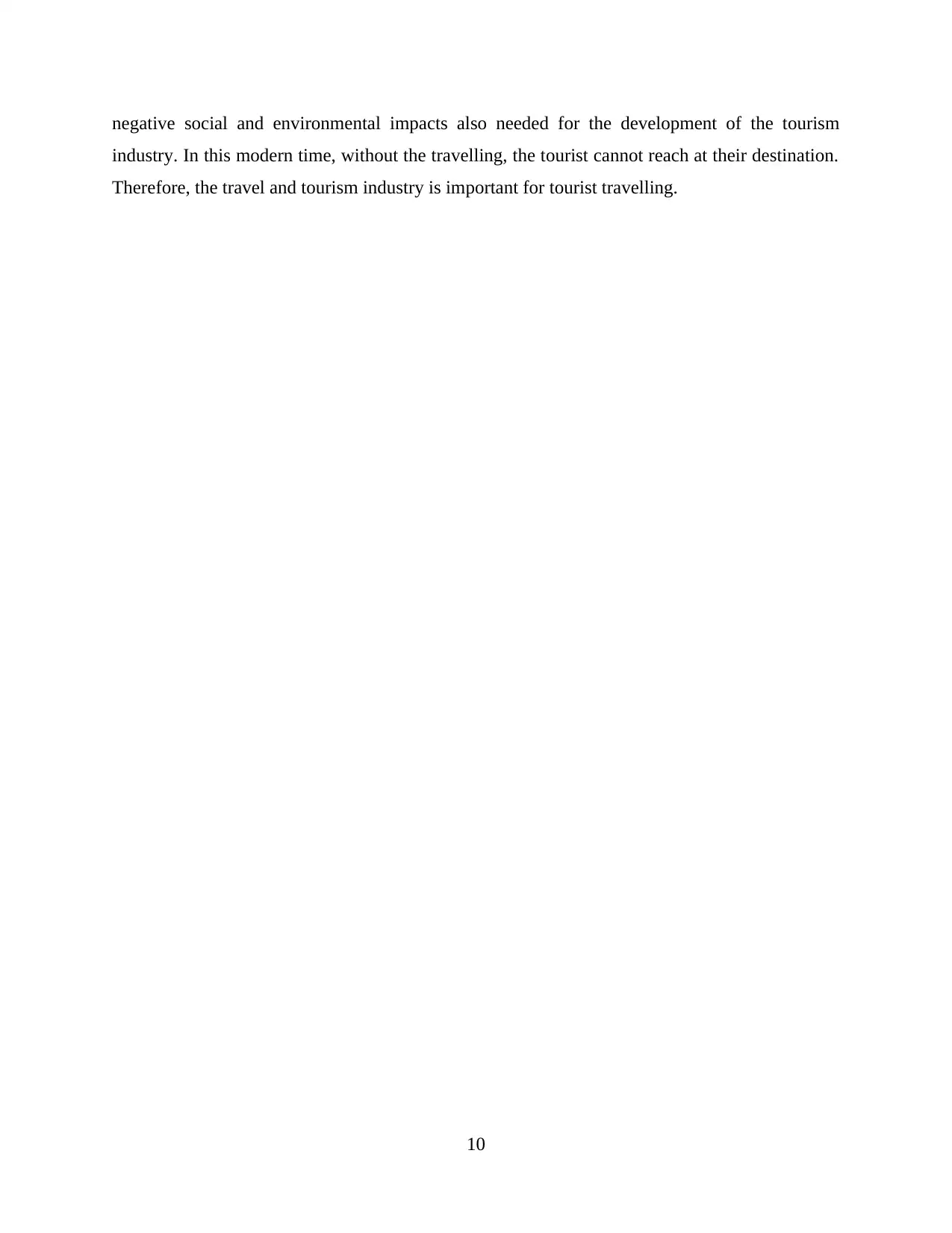
negative social and environmental impacts also needed for the development of the tourism
industry. In this modern time, without the travelling, the tourist cannot reach at their destination.
Therefore, the travel and tourism industry is important for tourist travelling.
10
industry. In this modern time, without the travelling, the tourist cannot reach at their destination.
Therefore, the travel and tourism industry is important for tourist travelling.
10
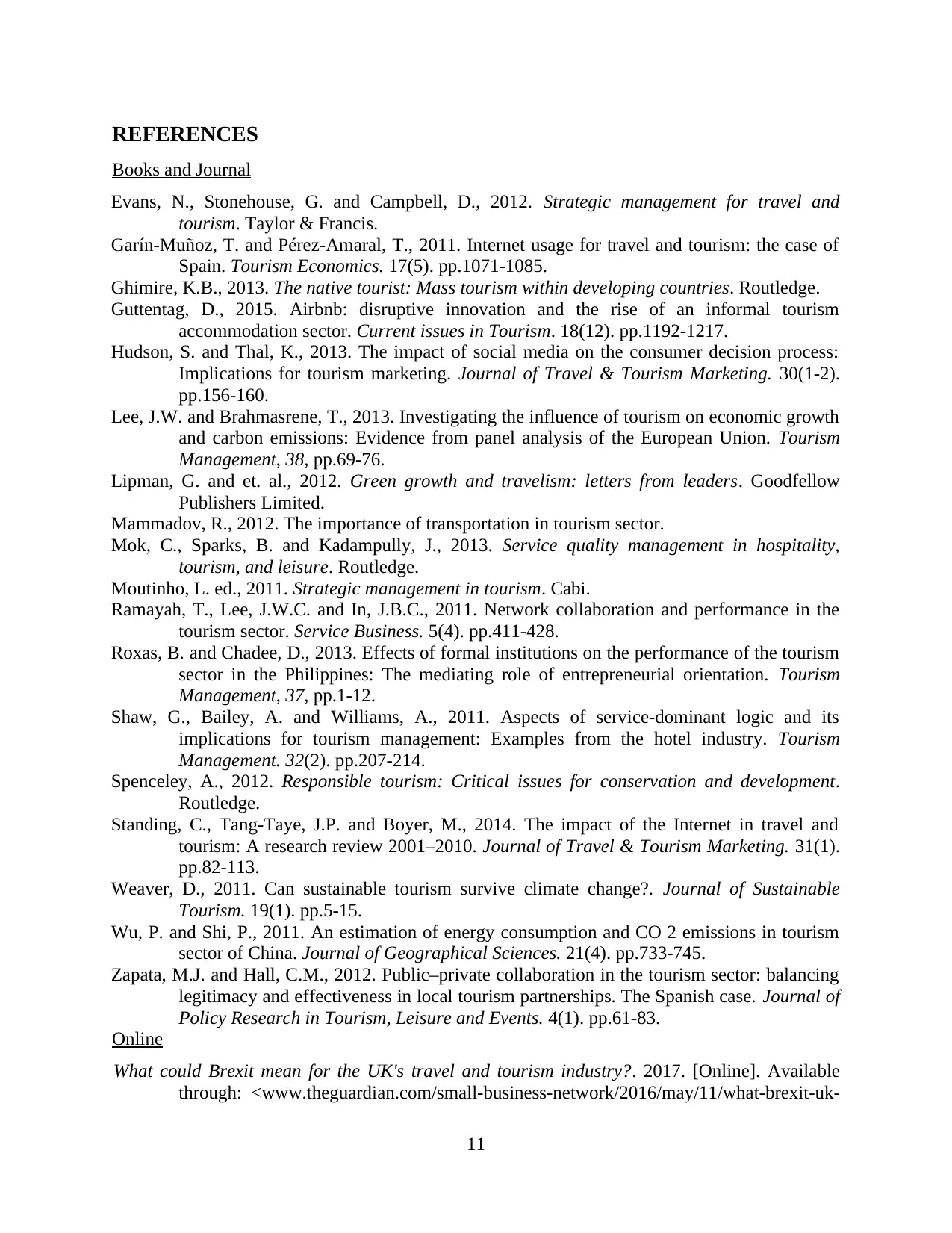
REFERENCES
Books and Journal
Evans, N., Stonehouse, G. and Campbell, D., 2012. Strategic management for travel and
tourism. Taylor & Francis.
Garín-Muñoz, T. and Pérez-Amaral, T., 2011. Internet usage for travel and tourism: the case of
Spain. Tourism Economics. 17(5). pp.1071-1085.
Ghimire, K.B., 2013. The native tourist: Mass tourism within developing countries. Routledge.
Guttentag, D., 2015. Airbnb: disruptive innovation and the rise of an informal tourism
accommodation sector. Current issues in Tourism. 18(12). pp.1192-1217.
Hudson, S. and Thal, K., 2013. The impact of social media on the consumer decision process:
Implications for tourism marketing. Journal of Travel & Tourism Marketing. 30(1-2).
pp.156-160.
Lee, J.W. and Brahmasrene, T., 2013. Investigating the influence of tourism on economic growth
and carbon emissions: Evidence from panel analysis of the European Union. Tourism
Management, 38, pp.69-76.
Lipman, G. and et. al., 2012. Green growth and travelism: letters from leaders. Goodfellow
Publishers Limited.
Mammadov, R., 2012. The importance of transportation in tourism sector.
Mok, C., Sparks, B. and Kadampully, J., 2013. Service quality management in hospitality,
tourism, and leisure. Routledge.
Moutinho, L. ed., 2011. Strategic management in tourism. Cabi.
Ramayah, T., Lee, J.W.C. and In, J.B.C., 2011. Network collaboration and performance in the
tourism sector. Service Business. 5(4). pp.411-428.
Roxas, B. and Chadee, D., 2013. Effects of formal institutions on the performance of the tourism
sector in the Philippines: The mediating role of entrepreneurial orientation. Tourism
Management, 37, pp.1-12.
Shaw, G., Bailey, A. and Williams, A., 2011. Aspects of service-dominant logic and its
implications for tourism management: Examples from the hotel industry. Tourism
Management. 32(2). pp.207-214.
Spenceley, A., 2012. Responsible tourism: Critical issues for conservation and development.
Routledge.
Standing, C., Tang-Taye, J.P. and Boyer, M., 2014. The impact of the Internet in travel and
tourism: A research review 2001–2010. Journal of Travel & Tourism Marketing. 31(1).
pp.82-113.
Weaver, D., 2011. Can sustainable tourism survive climate change?. Journal of Sustainable
Tourism. 19(1). pp.5-15.
Wu, P. and Shi, P., 2011. An estimation of energy consumption and CO 2 emissions in tourism
sector of China. Journal of Geographical Sciences. 21(4). pp.733-745.
Zapata, M.J. and Hall, C.M., 2012. Public–private collaboration in the tourism sector: balancing
legitimacy and effectiveness in local tourism partnerships. The Spanish case. Journal of
Policy Research in Tourism, Leisure and Events. 4(1). pp.61-83.
Online
What could Brexit mean for the UK's travel and tourism industry?. 2017. [Online]. Available
through: <www.theguardian.com/small-business-network/2016/may/11/what-brexit-uk-
11
Books and Journal
Evans, N., Stonehouse, G. and Campbell, D., 2012. Strategic management for travel and
tourism. Taylor & Francis.
Garín-Muñoz, T. and Pérez-Amaral, T., 2011. Internet usage for travel and tourism: the case of
Spain. Tourism Economics. 17(5). pp.1071-1085.
Ghimire, K.B., 2013. The native tourist: Mass tourism within developing countries. Routledge.
Guttentag, D., 2015. Airbnb: disruptive innovation and the rise of an informal tourism
accommodation sector. Current issues in Tourism. 18(12). pp.1192-1217.
Hudson, S. and Thal, K., 2013. The impact of social media on the consumer decision process:
Implications for tourism marketing. Journal of Travel & Tourism Marketing. 30(1-2).
pp.156-160.
Lee, J.W. and Brahmasrene, T., 2013. Investigating the influence of tourism on economic growth
and carbon emissions: Evidence from panel analysis of the European Union. Tourism
Management, 38, pp.69-76.
Lipman, G. and et. al., 2012. Green growth and travelism: letters from leaders. Goodfellow
Publishers Limited.
Mammadov, R., 2012. The importance of transportation in tourism sector.
Mok, C., Sparks, B. and Kadampully, J., 2013. Service quality management in hospitality,
tourism, and leisure. Routledge.
Moutinho, L. ed., 2011. Strategic management in tourism. Cabi.
Ramayah, T., Lee, J.W.C. and In, J.B.C., 2011. Network collaboration and performance in the
tourism sector. Service Business. 5(4). pp.411-428.
Roxas, B. and Chadee, D., 2013. Effects of formal institutions on the performance of the tourism
sector in the Philippines: The mediating role of entrepreneurial orientation. Tourism
Management, 37, pp.1-12.
Shaw, G., Bailey, A. and Williams, A., 2011. Aspects of service-dominant logic and its
implications for tourism management: Examples from the hotel industry. Tourism
Management. 32(2). pp.207-214.
Spenceley, A., 2012. Responsible tourism: Critical issues for conservation and development.
Routledge.
Standing, C., Tang-Taye, J.P. and Boyer, M., 2014. The impact of the Internet in travel and
tourism: A research review 2001–2010. Journal of Travel & Tourism Marketing. 31(1).
pp.82-113.
Weaver, D., 2011. Can sustainable tourism survive climate change?. Journal of Sustainable
Tourism. 19(1). pp.5-15.
Wu, P. and Shi, P., 2011. An estimation of energy consumption and CO 2 emissions in tourism
sector of China. Journal of Geographical Sciences. 21(4). pp.733-745.
Zapata, M.J. and Hall, C.M., 2012. Public–private collaboration in the tourism sector: balancing
legitimacy and effectiveness in local tourism partnerships. The Spanish case. Journal of
Policy Research in Tourism, Leisure and Events. 4(1). pp.61-83.
Online
What could Brexit mean for the UK's travel and tourism industry?. 2017. [Online]. Available
through: <www.theguardian.com/small-business-network/2016/may/11/what-brexit-uk-
11
Paraphrase This Document
Need a fresh take? Get an instant paraphrase of this document with our AI Paraphraser

travel-tourism-industry-visas>. [Accessed on 7th June 2017].What could Brexit
mean for the UK's travel and tourism industry?
What could Brexit mean for the UK's
12
mean for the UK's travel and tourism industry?
What could Brexit mean for the UK's
12
1 out of 14
Related Documents
Your All-in-One AI-Powered Toolkit for Academic Success.
+13062052269
info@desklib.com
Available 24*7 on WhatsApp / Email
![[object Object]](/_next/static/media/star-bottom.7253800d.svg)
Unlock your academic potential
© 2024 | Zucol Services PVT LTD | All rights reserved.





